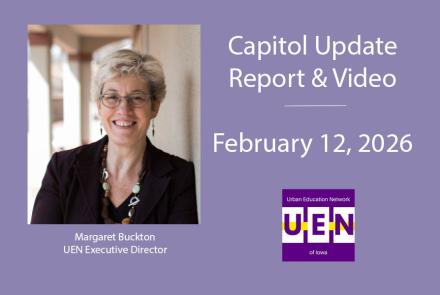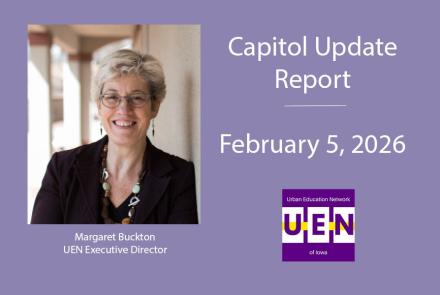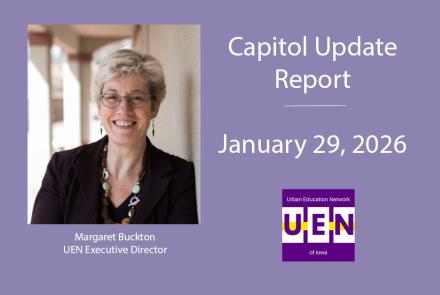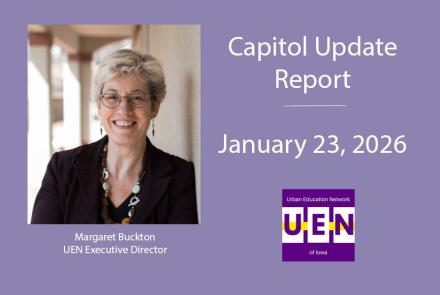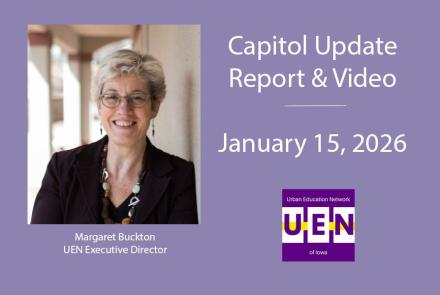Capitol Update - March 26, 2021
UEN Legislative Update
March 26, 2021
In this UEN Weekly Report from the 2021 Legislative Session, find information about:
- Next Funnel Deadline Approaching
- Charter Schools Advocacy Focus: Contact Senators before Monday
- Senate Republican Budget Targets and Tax Policy Bills
- Education Flexibility, Tuition and Textbook Tax Credits and Open Enrollment
- Bills on the Move
- Bills of Interest awaiting action before the next Funnel
Download the UEN Capitol Update for March 26, 2021
Legislative Funnel Deadlines
The second funnel, requiring bills out of a committee in the other chamber, is April 2. There are some exceptions, including appropriations bills, ways and mean (tax policy) bills, leadership bills and oversight committee bills. The funnels winnow down the mass volume of proposals to those that have a chance to move forward, allowing legislators, their staff, and lobby groups to focus their attention on priorities. Expect mostly committee action next week as legislators strive to move bills to survive this funnel deadline.
Advocacy Focus: Charter Schools HF 813
HF 813 Charter Schools. The bill was amended and approved in the House, 55-40, sending it to the Senate. A subcommittee of Sens. Sinclair, Johnson and Quirmbach is assigned with the Subcommittee meeting scheduled for March 30 at 1:30. See the February 26 UEN weekly report for complete summary of HF 813 (detailed under prior bill number of HSB 242). UEN is opposed to the bill. See an updated Call to Action on Charter Schools in the Senate here. Here are key provisions of the bill and amendments that improved it in the House:
- Two methods of charter school: school board application to state BOE or founding group application to state BOE without school board approval or oversight. However, the application requires evidence of need and community support, with criteria to be determined by DE rules
- Founding group can be an individual, individuals or education service organization (doesn’t have to be Iowans), must operate as a nonprofit (but can contract with for-profit). Application must specify how the governing board members are elected or selected.
- The charter school must file an annual report with the DE, contents to be determined by DE rules, but must include student achievement, including annual academic growth and proficiency, graduation rates, and financial performance and sustainability. This annual report is the only Charter school document subject to Chapter 22 public records.
- Requires the DE to submit an annual report to the Legislature which includes, for each charter school, a copy of the charter school’s mission statement, attendance statistics and dropout rate, aggregate assessment test scores, projections of financial stability, and the number and qualifications of teachers and administrators.
- Charter must notify the school district of residence of an enrolled student by March 1 of the preceding year.
- The prior year’s State Cost per Pupil, Teacher Leadership and Compensation, English-language Learner weighting and Post-Secondary Enrollment Options funding follows the student.
- Special education is billed just like open enrollment (district of residence gets the weighting and charter bills the district for actual expenses).
During the House debate of the bill, the following amendments were approved:
- Charter application must specify which rules/laws the charter won’t follow and DE is to provide technical assistance.
- Makes charter school governing board subject to open meetings (chapter 21).
- Requires charter school to provide to resident district documentation necessary for Medicaid billing.
- State pays for students enrolled in Charter school not on the prior year’s count (students previously served in home school, nonpublic school, or recently moved to the district). This is a standing unlimited appropriation.
- Eliminates transportation equity funding for charter schools (still requires they meet Chapter 285 transportation requirements).
- Requires at least half of governing board members to be residents of the school district/geographic area of the charter school and any remaining members to be Iowans.
- Requires the charter school to post their annual budget on their internet site and requires all historical budgets to remain posted.
- Requires the application for charter includes a description of staff performance evaluation measures, compensation structure, contract oversight methods and dispute resolution, investment disclosures and conflicts of interest.
- Limits maximum charter contract to 5 years (was originally limited to 10 years).
Senate Republican Budget Targets and Tax Cuts (reported in the IALNS Newsletter Mar.24 & 25)
Senate Republicans released their budget for FY 2022. The Senate Republicans propose spending $7.999 billion, an increase of $195 million from FY 2021 and 94% of the spending limit (Iowa law sets the expenditure limitation at 99% of available funds, so this target is well below available resources.) Governor Reynolds has proposed spending about $8.1 billion, so this target is $101 million below the Governor’s Budget Recommendation.
Republicans said that their proposals include SF 576 Elimination of Tax Triggers and Inheritance Tax, which strikes the revenue goals that trigger the 2023 tax cuts and phases out the inheritance tax over four years starting in 2023. See detailed description below. The Senate approved SF 576 on a 46-0 vote, sending the bill to the House. Senate Republicans are also moving SF 587 Tax Changes forward. The Senate Ways & Means Committee approved the bill on Thursday. Critical to school districts, this bill eliminates the Public Education and Recreation Levy. The IALNS reported, “Republicans say that the bill will shift $60 million in funding from county property taxes in the first year and $125 million in later years. Democrats said that Republicans will eliminate a historically stable funding source for MH spending and end the property tax backfill, which was a key component of the compromise between Republicans and Democrats on property tax reform several years ago.” UEN is opposed to both SF 576 and SF 587.
SF 576 Elimination of Tax Triggers and Inheritance Tax: this bill Strikes 2018 Iowa Acts, chapter 1161, section 133 (contingent income tax system trigger requirements), and replaces the section with an unqualified effective date of January 1, 2023. The Fiscal Note explains how close the revenue estimates are to hitting the trigger. “The FY 2022 revenue projection is therefore $48.9 million below the dollar trigger and 0.3 percentage points below the required 4.0% growth trigger.” Other proposed tax cuts, even very minor ones, could prevent the trigger from being reached, which provides some explanation of why the Senate voted 46:0 to move this bill forward. The bill also phases out and then repeals the inheritance tax and the qualified use inheritance tax. The changes are effective upon enactment and apply retroactively to deaths occurring on or after January 1, 2021. The following table estimates the fiscal impact, including a reduction of $10.8 million over the five fiscal years for school district income surtaxes (that provide funds for PPEL or ISL – however, that becomes a shift to property tax if the income surtax revenue is reduced.)
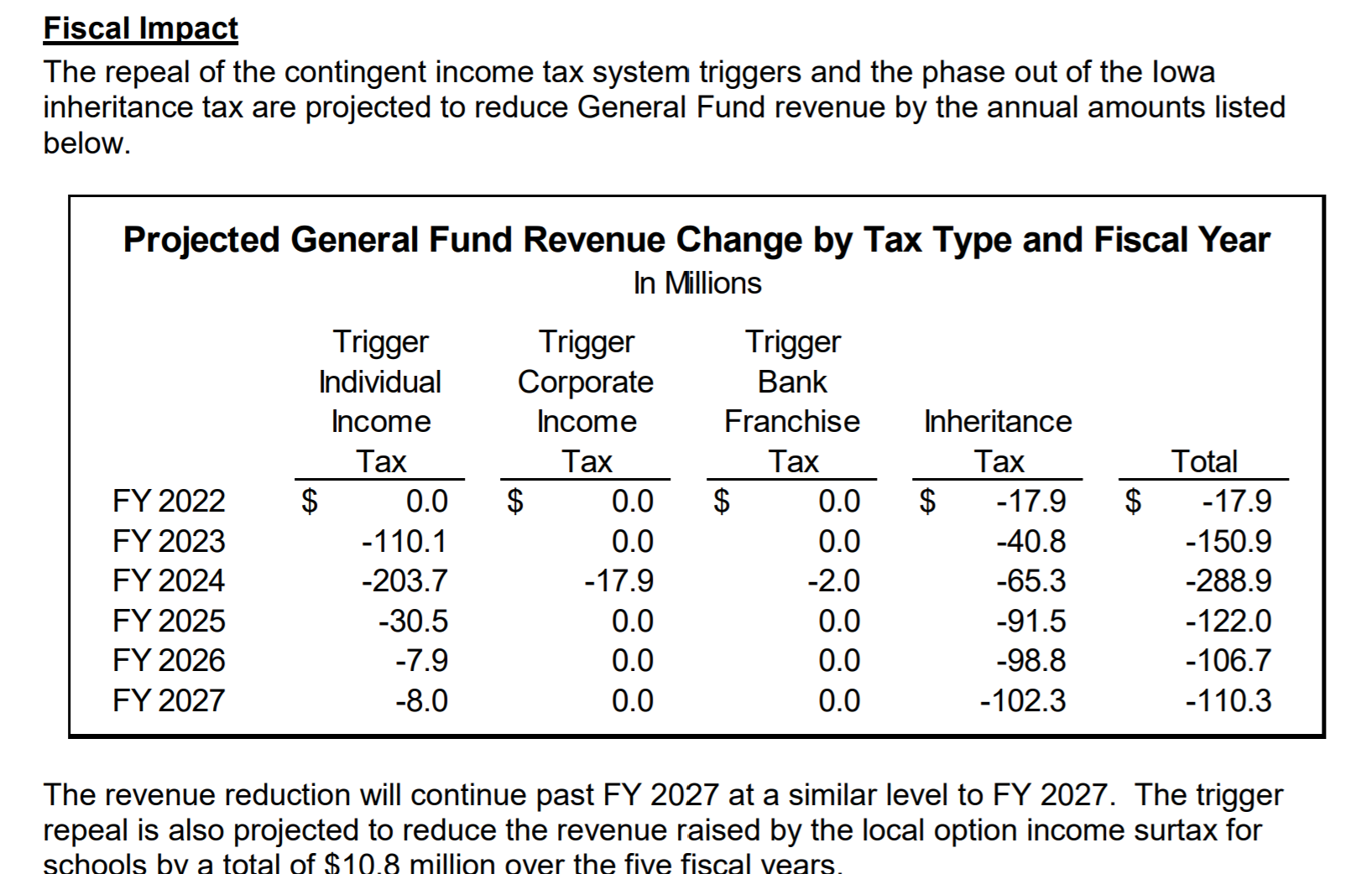
UEN is registered opposed to the bill.
SF 587 Tax Changes: this bill has many provisions that could impact schools and others that don’t. Those provisions likely of interest to you:
- Creates a mental health and disability services fund and uses state funds rather than property taxes to pay for it (there is no mention of child mental health services in the bill.)
- Eliminates the Commercial and Industrial (C&I) backfill (the state amount has been frozen since FY 2017) and raises the State Foundation Percentage from 87.5% to 88.4%. The state C&I backfill is currently $60 million for K-12 and the estimated cost of raising the foundation percentage takes about $60 million increase in state cost. Although that’s a wash for the state, the application of the changes to individual school districts creates winners and losers based on the percentage of valuation is C&I in the district. For foundation formula property tax impact on your school district, it will vary based on valuation supporting each student. However, those districts who have a higher proportion of non-General Fund levy to General Fund levy will see an impact on PPEL (lower revenues) Management Fund (shift to higher rate) and Debt Service (lower revenues). The good news is that the change is permanent, so more secure than a different legislature every year proposing changes to the state’s contribution to the C&I hold harmless.
- Eliminates the public education and recreation levy (PERL) effective July 1, 2022. There are currently 27 districts who levy the PERL for over $10 million annually statewide. The bill allows SAVE/state penny to pay for adult and community education under Iowa Code 300 and 276.10.
- There is not a fiscal note yet published on the financial impact of SF 587. We will cover in more detail next week when we have access to that information. UEN is registered opposed to the bill.
HF 847 Education Flexibility, Tuition and Textbook Tax Credits and Open Enrollment: amended and approved 62:33 in the House. UEN is registered as undecided, in support of some provisions and opposed to others. The bill as amended has five divisions:
Division I Education Program Standards and Funding: Sections 1 creates a flexible student and school support program established by state board to foster innovation, which includes the following details:
- State BOE approval exempts the district or nonpublic schools from one or more of the following:
- specific curriculum and course offering requirements (Iowa Code 256.11 subsections 3-5)
- physical activity/PE requirements (256.11 subsection 6 b and 6c)
- school start date and minimum days and hours (279.10 subsection 1)
- Public and nonpublic schools may be granted participation for up to three years in the student and school support program to implement evidence-based practices in innovative ways to enhance student learning, well-being and post-secondary success
- This provision also provides ability of the school board to transfer ending balances from TLC remaining after meeting the requirements of the programs, to the Flex Account. Those funds can be used for any general fund purpose, for preschool expansion and for the addition of this new innovation program.
- A new provision added during debate requires districts to pay any remaining balances of TSS from years prior to July 1, 2021, the portion above 5% of the funds received for the fiscal year beginning July 1, 2021, to school district employees otherwise eligible to receive TSS funds on a per-employee basis determined based on each eligible employee’s full-time or part-time employment status. The subsection is repealed July 1, 2023.
UEN supports this provision.
Division II: Education Tax Credits and Deductions: the bill increases the educator and tuition and textbook tax credits via the following:
- Educator expense deduction: Doubles the maximum amount a teacher/taxpayer may deduct from $250 to $500
- Allows home school families to claim the tuition and textbook tax credit
- Increases the amount of allowed expenses from $1,000 to $2,000 but maintains the credit to 25% of the amount (not to exceed $500).
The Fiscal Note to SF 159 estimates the impact of the tuition and textbook tax credit expansion to be $12 million (see table below). UEN is opposed to this Division of the bill but appreciates this more modest approach compared to the original version of the bill which was a $51 million expansion of the tax credits.
Division III: Open Enrollment: Several provisions are more technical or clarifying in nature, such as
- allows open-enrolled students to participate immediately in sports if sports have been suspended in the original district but maintains ineligibility if the student is ineligible for academic reasons.
- makes the open enrollment deadline for pre-K students needing special education as Sept. 1
- adds to good cause the change in enrollment from one parent/guardian’s residence to another, and
- clarifies that the district of residence on count date is responsible for special education costs associated with an open enrollment.
Other open enrollment provisions (UEN expressed our opposition to the ESSA designation as a condition for good cause open enrollment and is undecided on the other provisions):
- the addition of the ESSA designation as a school in need of comprehensive support and improvement and the Priority School designation from the Iowa School Report Card for the preceding two years to the good cause list for open enrollment.
- the addition of criteria of the consistent failure of the resident district to reasonably respond to a student’s failure to meet basic academic standard. The bill requires the State Board of Education to establish criteria for this provision through the rule-making process.
- raises income eligibility for districts of residence to cover transportation costs for open enrolled students up to at least 200% of the federal poverty level and allows the DE and State BOE to set the limitations.
- changes the waiting period for varsity athletic eligibility to 90 calendar days rather than school days.
- requires an open-enrolled athlete to fulfill any academic requirements of ineligibility from the resident district before participating.
Division IV: this division specifies that school boards are responsible for improving student achievement, which we believe is already the expectation, so UEN has no concerns about this provision.
Division V: Shared Operational Functions: Adds a work-based learning coordinator and special education director to shared operational functions, defines work-based learning coordinator for purposes of receiving the weighting, and effective July 1, 2022 through July 1, 2024, lowers the weightings for operational functions equivalent to 5 pupils down to 4 pupils, and lowers those operational functions equivalent to 3 pupils down to 2 pupils. UEN is neutral on this provision.
The fiscal note estimates the state and local impact of the bill in the following table:
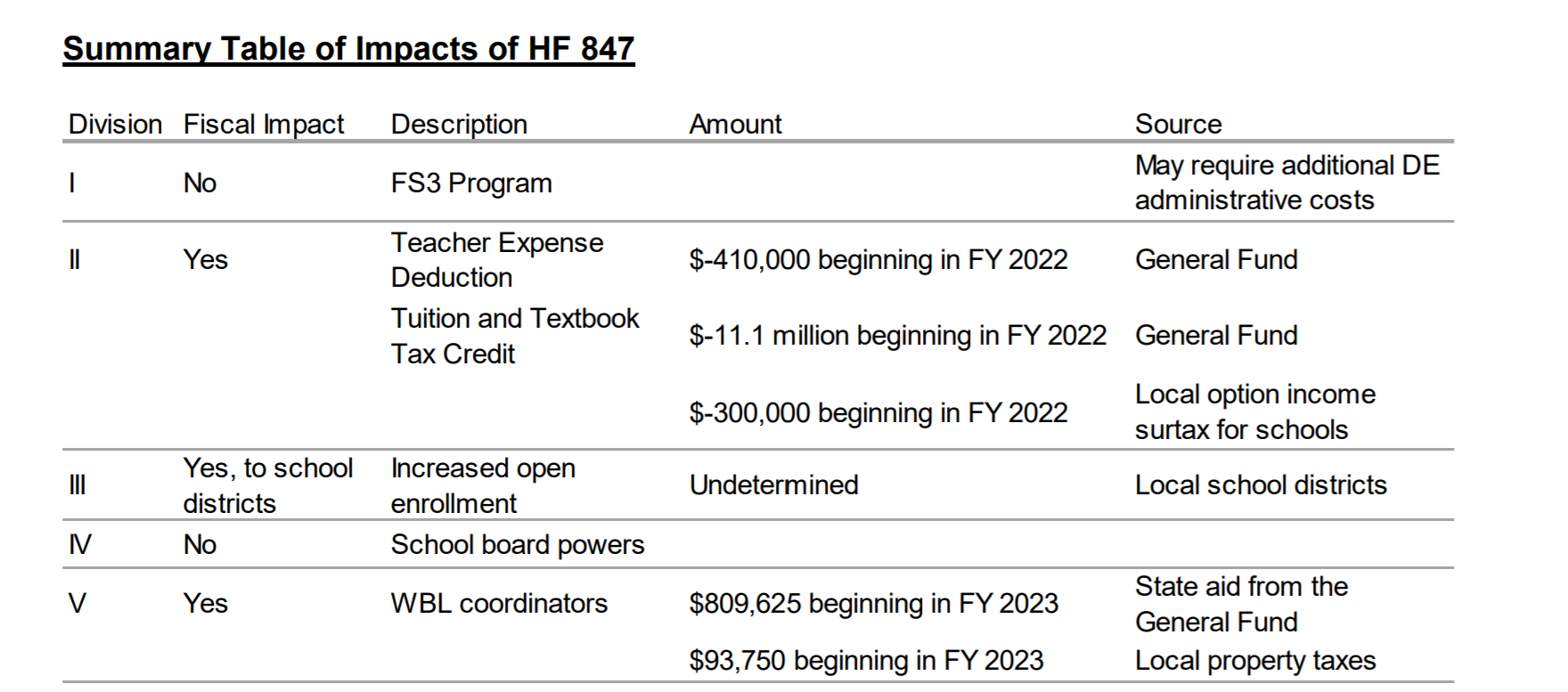
UEN has registered undecided on this bill in its current form. The bill will be assigned to the Senate Education Committee, but with the tax credit provisions, is a Ways and Means bill, so exempt form next week’s funnel deadline.
Bills on the Move
SF 260 Reimbursements for Special Education Services: this bill requires the receiving district to provide documentation for Medicaid billing for open enrolled students receiving special education services, so the resident district can claim Medicaid reimbursement. The bill was approved in the Senate 47:0. The House Education Committee has assigned a subcommittee of Reps. Kerr, Dolecheck and Donahue, with a meeting scheduled March 30. UEN supports this bill.
SF 425 Open Meetings Subjects: this bill requires any deliberations or actions taken by a government within the budgetary duties of the body be subject to the open meetings laws. Requires reasonable notice to include notice to any person who has requested notice of a meeting and excludes weekends and holidays when considering the 24-hour time period for posting notices. The Senate approve the bill 30-17, sending it to the House. A subcommittee of Reps. Sexton, Konfrost and Siegrist met on Thursday morning. The bill is in the House State Government Committee. UEN is registered opposed.
SF 532 Behavioral Analysts: this bill requires the BOEE to create a credential (statement of professional recognition) for Behavioral Analysts and Mental Health Counselors. The bill was approved in the Senate 47:0. The House Education Committee has assigned a subcommittee of Reps. Gobble, Dolecheck and Ehlert. UEN supports this bill.
HF 318 Preschool for Young 5-year-olds: this bill would allow school districts to serve and count 5-year-olds with a birthday by March 15 in the Statewide Voluntary Preschool Program. The bill first applies to FY 2023 and is a pilot project for three years. The subcommittee of Sens. Taylor, Sinclair and Quirmbach met and recommended the bill move forward to the full Senate Education Committee. UEN is registered in support.
HF 724 Adoptive Parents: this bill requires employers to treat employees who adopt a child up to the age of 6 in the same manner as a biological child. Increase restrictions on the use of disability leave. The House passed the bill 95:0 and sent it to the Senate. UEN is registered as undecided.
HF 744 College and School District Free Speech Rights: Section 3 of the bill applies to school districts. It requires school boards to protect the intellectual freedom of the school district’s students and practitioners and establish and publicize policies that protect students and faculty from discrimination based on speech. Prohibits retaliation against a person who files an associated complaint and provides whistle-blower protections if the complainant is an employee of the school district. Requires the school board or court, if an employee is found to have discriminated against a student or employee in violation of this section, to report to the BOEE and the BOEE to conduct a hearing, which may result in disciplinary action and the employee’s employment may be terminated. The House approved the bill 97-1, sending it to the Senate. The subcommittee of Sens. Taylor, Sinclair and Quirmbach stated their intention to move the bill forward on March 23. They discussed removing the student newspaper provisions from HF 802 and amending on to this bill, which deals with free speech rights. We expect the bill to be on the Senate’s Education Committee agenda for Tuesday. UEN is registered as undecided.
HF 756 Weapons Matters: this bill changes gun permit and carry laws. UEN is specifically concerned about Division II, which allows the following individuals to carry or transport a firearm on school property:
• A person who has been specifically authorized by the school to carry or transport a firearm for a lawful purpose.
• A peace officer, including a peace officer who has not been certified and a federal officer when the officer’s employment requires going armed, regardless of whether the officer is on duty.
• A member of the U.S. Armed Forces or National Guard, when the weapon is carried in connection with the member’s official duties. Fiscal Note Fiscal Services Division 2
• A correctional officer, as part of the officer’s official duties.
• A person who for any lawful purpose carries an unloaded pistol, revolver, or other firearm inside a closed and fastened container or securely wrapped package that is too large to be concealed.
The fiscal note has an assumption “that any property and employee liability insurance claims arising out of the expansion of the group of persons allowed to carry a firearm on school grounds will likely be covered by existing school liability insurance policies.” If there are incidents and claims, a likely increase in premiums will follow, increasing needed revenues to the Management Fund. This bill was amended and approved by the Senate, 31:17, sending it back to the House. UEN is registered opposed.
HF 802 Racism/Diversity Training: this bill establishes requirements for diversity training, on racism and sexism, in schools and colleges including prohibiting teaching that Iowa is fundamentally racist or sexist. The bill prohibits political subdivisions, including school districts, from providing any mandatory staff training from teaching, advocating, acting upon or promoting divisive concepts and race or sex scapegoating but does not prevent an employee or contractor who provides mandatory training from responding to questions regarding divisive concepts raised by participants in the training. The bill was expanded to cover state and local governments. The bill also prohibits teaching of divisive concepts or race or sex scapegoating in the curriculum. See the March 18 UEN Weekly Report for a detailed description of the bill.
The House approved the bill as amended 59-38, sending it to the Senate. The subcommittee of Sens. Taylor, Sinclair and Quirmbach met this week and stated their intention to amend the bill. We anticipate the diversity training provisions will be more similar to the Senate version, SF 487, but that will likely happen on the Senate floor and not in the committee discussion next week. The bill will likely be on the Senate’s Education Committee agenda for Tuesday. UEN is registered as undecided.
HF 848 Broadband Grants: this bill creates tiers of internet speed, provides for incentives for the expansion of high-speed internet across the state and defines areas of need. The bill was approved by the House Appropriations Committee and is on the House Appropriations Calendar, so exempt from the funnel deadline. UEN supports the bill.
Bills Still Pending with Possible Action Next Week
SF 265 School Promotions by Parent Consent: this bill would have required school districts to retain students in their prior grade based on parent request by Aug. 15 of 2021, providing a reset on the 2020-21 COVID school year. Members of the education committee, including UEN, testified that schools already work with parents in determining placement of students and there was no need for the bill. Also, the Aug. 15 deadline was too late for scheduling and staffing processes. Reps. Wheeler (C), Salmon, and Staed agreed and did not move the bill forward. Despite the subcommittee’s original intention, the bill appeared on the Education Committee agenda for March 24, but that meeting was cancelled due to late debate. We expect the bill to be discussed in the House Education Committee next week. UEN is registered as undecided on the bill.
SF 466 Occupational Therapists and Concussions: the bill allows occupational therapists to serve as the medical professional regarding concussion management at an athletic event. The Subcommittee of Representatives Bush (C), Bradley, and Mascher recommended the bill move forward to the full House Human Resources Committee, but the Committee has not yet moved the bill forward. UEN is registered undecided the bill.
SF 467 Education Online Learning: this bill prohibits schools from using continuous online/remote learning unless done according to a proclamation by the Governor or as approved by Iowa Code 256.7 subsection 32 (DE approval of virtual programs) or 256.11 subsection 17 (offer and teach requirements). The bill allows for up to five virtual days for snow/inclement weather or other unforeseen emergencies. The bill also states that schools are not mandated to offer continuous online learning unless required by law to serve students with disabilities or required after a public health proclamation. The Senate approved the bill as amended 47-0; a subcommittee has not yet been scheduled, which will be required for House Education Committee action next week to survive the funnel. UEN supports the bill.
SF 544 LEP Tiered Weighting and HF 604 On Senate Calendar: this bill creates two tiers of supplementary weighting for students receiving English-language learning supports. A Weighting of .21 is generated for students with intermediate needs and a weighting of .26 funding is generated for students with intensive needs. The current weighting for all ELL students is .22. The weighting is effective for the 2021-22 school year. UEN supports this policy change recommended by the English Language Learner Task Force in 2013 and looks forward to additional discussion next year to implement other task force recommendations, including weighting that approaches the national average of 0.3.
HF 288 Diversity Plan Open Enrollment Regulation Ban: this bill bans the ability of five districts with voluntary diversity plans (Davenport, Des Moines, Postville, Waterloo and West Liberty) to regulate open enrollment out of the district based on their plans, which currently review socioeconomic status (income) or English-language learner classification as metrics to consider. None of these districts uses race as a metric, which was banned as a sole measure of consideration by a Supreme Court decision in 2007.
The goals of the diversity plans are to preserve a mix of diversity and prevent segregation of schools in these districts. There is a solid research base that shows a concentration of poverty which hits a tipping point at 50-60% and segregated schools negatively impacts student achievement, economic growth and workforce diversity for such communities. See the UEN Issue Brief explaining the issue and showing data on poverty, minority, open enrollment and certified enrollment for these districts and for similar districts without voluntary diversity plans.
The bill is still on the Senate Calendar. Sen. Sinclair anticipated an amendment would be forthcoming with a date change when debated in the Senate. UEN is registered in opposition.
HF 431 Telehealth Phone Calls: this bill would allow audio-only telehealth or telemedicine by healthcare professionals. The bill was approved by the Senate Human Resources Committee, moving it to the Senate Calendar. UEN supports the bill.
HF 532 One-Time Funding Instructional Supplement: the full Senate Education Committee is expected to move this bill forward to the Senate floor, with a significant amendment expected on the Senate Floor to simplify the eligibility for the funding supplement so district do not have to count fully in-person, hybrid or virtual days, and Sen. Sinclair has stated her intent to include direction to the Governor to use GEERS early childhood funds for the anticipated increase of preschool students in the Fall of 2021 as the state rebounds from the pandemic. UEN is currently registered as opposed and looks forward to more details about the amendment.
HF 675 – Substitute Teacher Authorization: this bill requires the Board of Education Examiners to create a substitute teacher authorization, allowing a substitute to teach no more than 10 consecutive days in a 30-day period in one job assignment, except in the driver’s education classroom. The bill allows a school district administrator to file a written request with the BOEE for an extension of the 10-day limit on the basis of documented need and benefit to the instructional program. The BOEE is required to review the request and provide a written response. Specifies that the authorization not require less than the successful completion of an associate degree or 60 undergraduate semester hours, or the equivalent, from a college or university accredited by an institutional accrediting agency recognized by the United States DOE. The bill has already survived the funnel deadline, as it sits on the Senate Calendar. UEN supports the bill.
Connecting with Legislators:
Find biographical information about legislators gleaned from their election websites on the ISFIS site here: http://www.iowaschoolfinance.com/legislative_bios Learn about your new representatives and senators or find out something you don’t know about incumbents.
Find out who your legislators are through the interactive map or address search posted on the Legislative Website here: https://www.legis.iowa.gov/legislators/find
To call and leave a message at the Statehouse during the legislative session, the House switchboard operator number is 515.281.3221 and the Senate switchboard operator number is 515.281.3371. You can ask if they are available or leave a message for them to call you back.
Advocacy Resources:
UEN recently launched a new website. More tools and resources will be added, but go to www.uen-ia.org to find Advocacy Resources such as Issue Briefs, UEN Weekly Legislative Reports and video updates, UEN Calls to Action when immediate advocacy action is required, testimony presented to the State Board of Education, the DE or any legislative committee or public hearing, and links to fiscal information that may inform your work. The latest legislative actions from the statehouse will be posted at: www.uen-ia.org/blogs-list. Check out the UEN Advocacy Handbook linked here, and also available from the subscriber section of the UEN website
Thanks to our UEN Corporate Sponsors:
Special thank you to your UEN Corporate Sponsors for their support of UEN programs and services. You can find information about how these organizations may help your district on the Corporate Sponsor page of the UEN website at https://www.uen-ia.org/uen-sponsors.
 |
Contact us with any questions, feedback or suggestions to better prepare your advocacy work:
Margaret Buckton
UEN Executive Director/Legislative Analyst
margaret@iowaschoolfinance.com
515.201.3755 Cell


